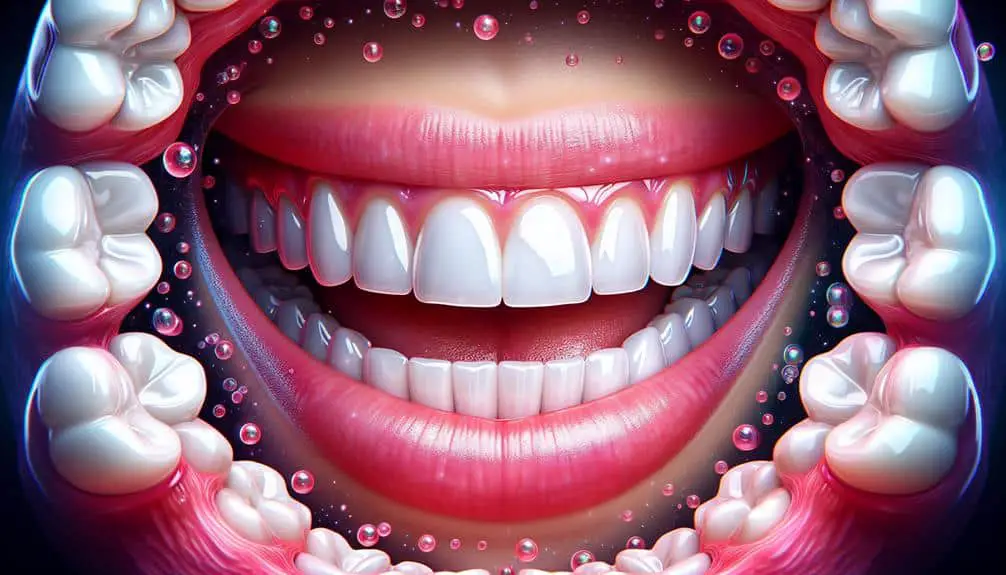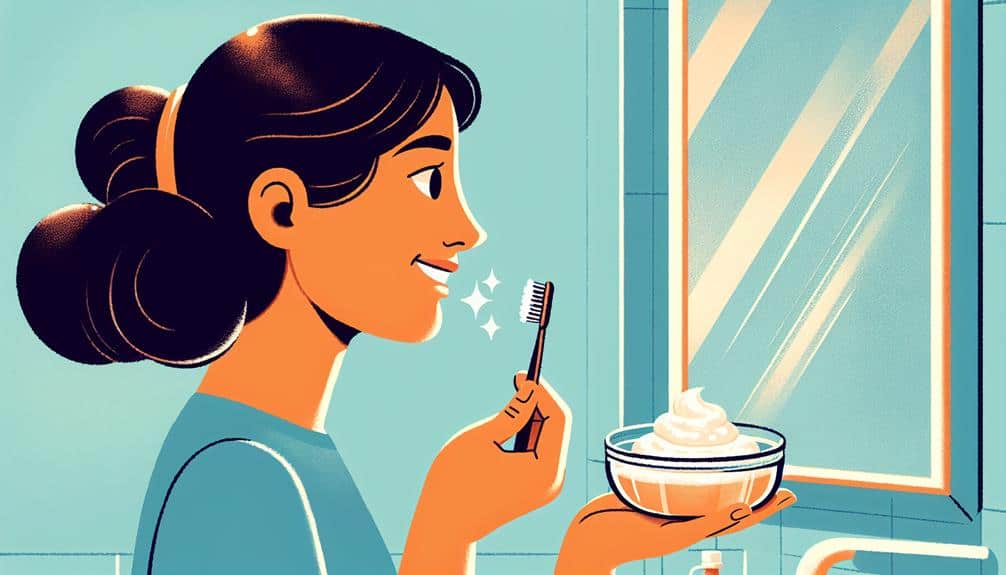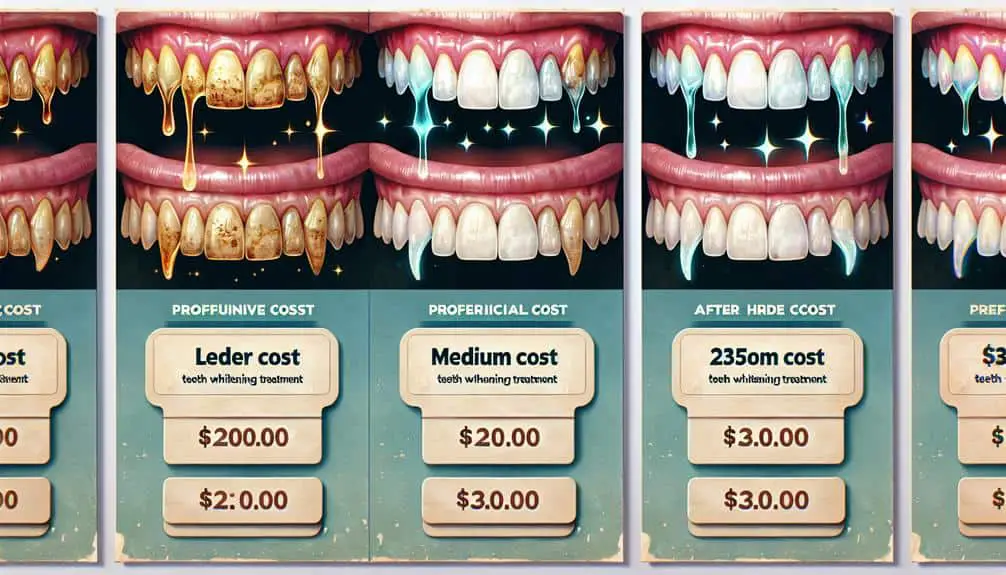Teeth whitening is more than just a cosmetic procedure; it can greatly benefit your oral health. To start with, it reduces inflammation and plaque buildup, promoting healthier gums and preventing gum disease. In addition, by enhancing oral hygiene and cleanliness, whitening helps in maintaining a healthy mouth, motivating you to schedule regular dental check-ups. Lastly, whiter teeth not only reduce the risk of decay but also make it easier to spot decay early, leading to improved oral hygiene habits and boosted self-confidence. These benefits showcase how teeth whitening contributes to your overall oral well-being.
Key Points
- Teeth whitening reduces plaque buildup and inflammation, promoting healthier gums.
- It enhances oral hygiene and cleanliness, making it easier to spot decay early.
- Improved gum health results from reduced inflammation and bacteria, benefiting overall oral health.
- Regular whitening encourages dental visits, reducing sensitivity and enhancing confidence.
- Whitening reduces the risk of decay by maintaining good oral hygiene practices and removing plaque.
Improved Gum Health
Improving gum health through teeth whitening treatments can help reduce inflammation and promote overall oral health. Healthy gums are essential for maintaining strong teeth and preventing gum disease. Teeth whitening can contribute to healthier gums by reducing bacteria in the mouth, which is often the cause of gum inflammation. Additionally, the process of teeth whitening can help remove plaque buildup on the teeth, further supporting gum health.
Prevention tips for maintaining healthy gums include practicing good oral hygiene habits such as brushing teeth twice daily, flossing regularly, and using an antiseptic mouthwash. Visiting your dentist for regular check-ups and cleanings is also vital in preventing gum disease and ensuring overall oral health. Moreover, avoiding tobacco products and maintaining a balanced diet can greatly impact the health of your gums.
Enhanced Oral Hygiene
Enhance your oral hygiene with teeth whitening treatments to achieve a brighter smile while promoting overall dental health. Teeth whitening not only enhances the aesthetics of your smile but also plays an important role in preventive care. Here's how teeth whitening can improve your oral hygiene:
- Removal of Stains: Teeth whitening procedures effectively remove stubborn stains that regular brushing may not eliminate, improving the overall cleanliness of your teeth.
- Increased Confidence: A whiter smile can boost your confidence, encouraging you to maintain good oral hygiene practices such as regular brushing and flossing.
- Reduced Plaque Build-up: By removing surface stains, teeth whitening can help prevent the build-up of plaque, reducing the risk of gum disease and cavities.
- Regular Dental Visits: The motivation of having a bright smile from teeth whitening can lead to more frequent visits to the dentist, ensuring that your oral health is regularly monitored and maintained.
Reduced Risk of Decay
To reduce the risk of decay, maintaining good oral hygiene practices such as regular brushing and flossing is essential for preserving the health of your teeth. Teeth whitening plays a pivotal role in this aspect by not only giving you a brighter smile but also by reducing sensitivity and enhancing your overall oral health.
When your teeth are whiter, it becomes easier to spot any signs of decay or cavities, prompting you to take action promptly. Additionally, the process of teeth whitening often involves removing plaque and tartar buildup, which are major contributors to tooth decay. By eliminating these harmful substances, you're creating a healthier environment for your teeth, reducing the likelihood of decay.
Moreover, a brighter smile can boost your confidence, leading to improved oral hygiene habits. When you're proud of your smile, you're more likely to take better care of your teeth through regular brushing, flossing, and dental check-ups. Ultimately, teeth whitening not only enhances your appearance but also contributes to a healthier mouth with reduced risk of decay.
Frequently Asked Questions
Can Teeth Whitening Treatments Help With Sensitive Teeth?
Teeth whitening treatments can help with sensitive teeth by preventing sensitivity and protecting enamel. The treatments work to strengthen enamel, reduce sensitivity, and enhance oral health overall. Consult with your dentist for personalized recommendations.
How Long Do the Effects of Teeth Whitening Typically Last?
You may wonder how long the effects of teeth whitening last. With proper maintenance tips and lifestyle habits, the longevity can vary. Regular touch-up options can help extend the results, ensuring a brighter smile.
Are There Any Potential Side Effects or Risks Associated With Teeth Whitening?
When considering teeth whitening, it's important to be aware of potential risks. Precautions like following instructions and consulting a dentist can help. Maintenance is key for longevity of results. Stay informed for a successful experience.
Can Teeth Whitening Treatments Be Done at Home, or Is It Recommended to See a Professional?
For effective results and safety, professional teeth whitening is recommended over DIY methods. While DIY options may seem cost-effective initially, professional treatments offer better results and are supervised by experts for best oral health.
Are There Any Foods or Drinks to Avoid After Getting Teeth Whitening Treatments?
After teeth whitening treatments, to prevent staining, avoid foods and drinks like coffee, tea, red wine, and dark berries. Post-treatment care is vital; opt for lighter-colored foods, drink through a straw, and maintain good oral hygiene.



